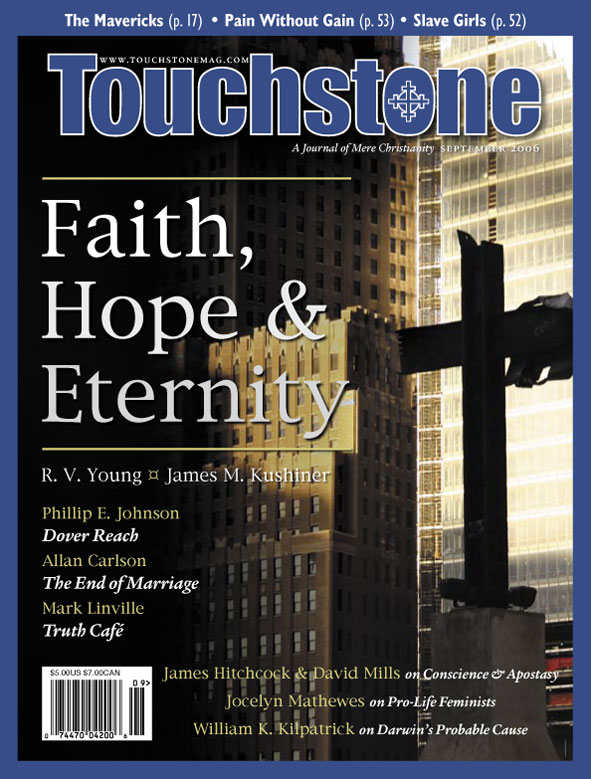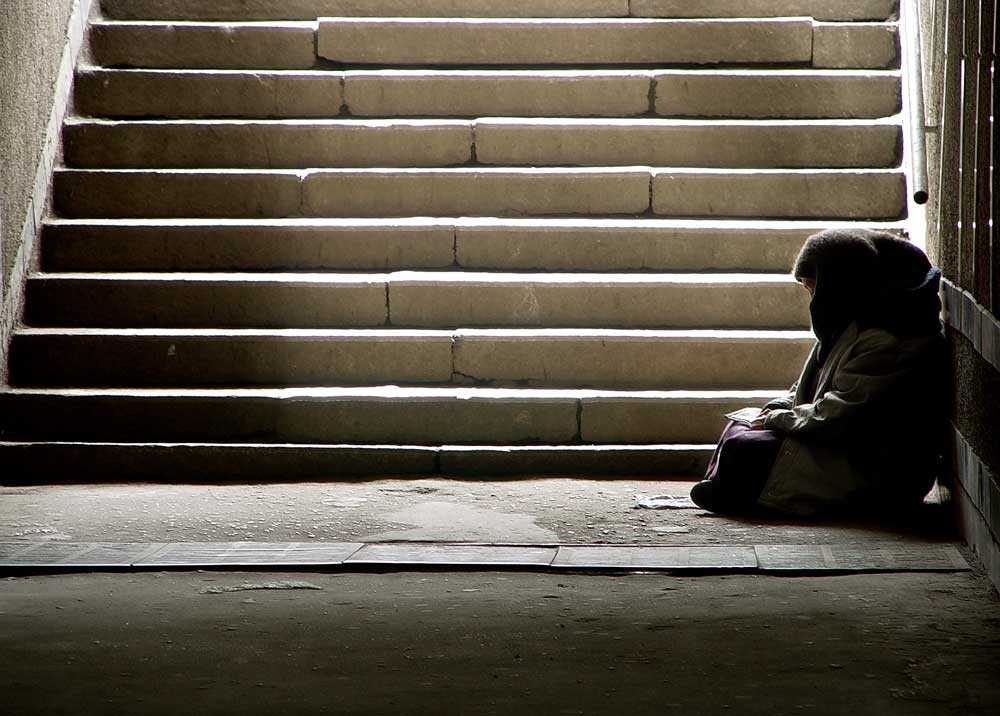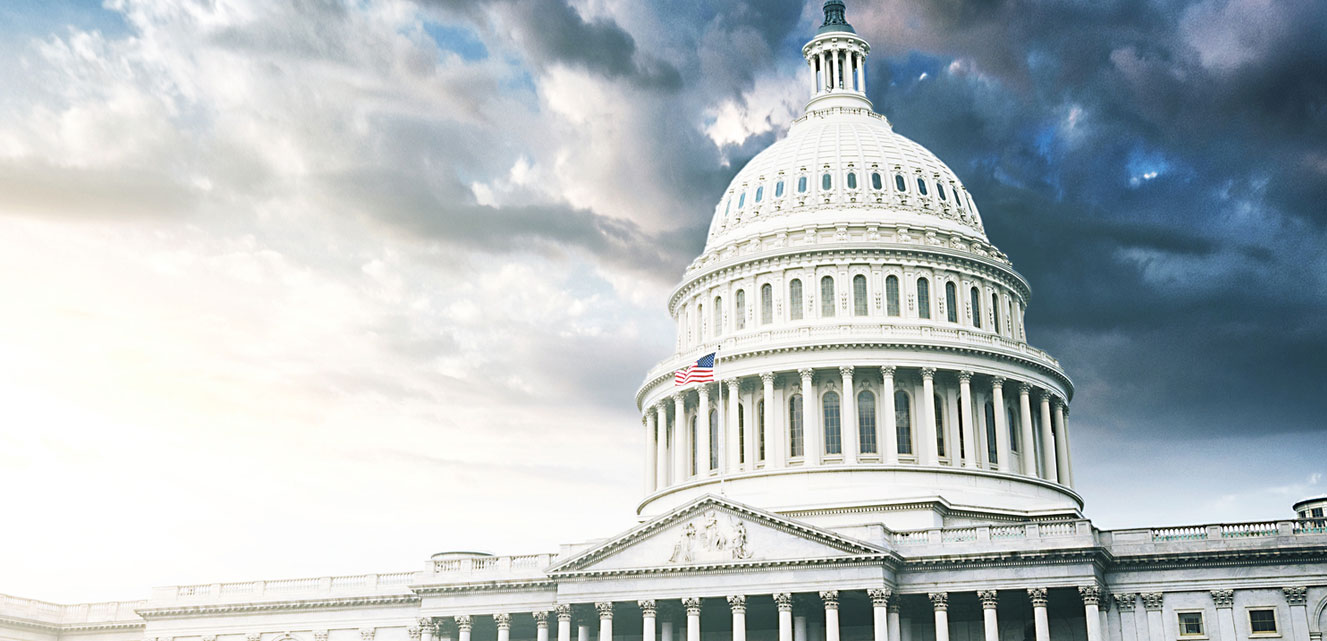Editorial
Without Conscience
When Pluralism Means Disobedience & Rancor
The “Gospel of Judas” is rediscovered, which leads some people, and one famous magazine, to announce triumphantly that the entire New Testament story has been turned on its head. The Bible the Church has given us is fundamentally in error about Judas and the whole story of the Crucifixion, and this, along with the continually rediscovered Gnostic gospels, is taken as evidence that the original Christianity was a kinder, gentler, more informal, affirming, and egalitarian religion than the mainstream Christianity of tradition—a religion that just happens to be more congenial to modern tastes and desires.
This is an attack on the faith all Christians share, but each tradition suffers its own special trials from those of its own members who want to remake it. In some cases, these people have taken control of the church’s hierarchy. This past summer, the Episcopal Church entrenched teachings on ordination and sexual morality that would have left Thomas Cranmer in shock, while the Presbyterian Church was willing to receive and commend a report approving a variety of names for the Persons of the Trinity of a kind John Calvin would have thought self-evidently heretical.
Even those traditions thought (by outsiders) to be securely monolithic suffer similar trials. The Southern Baptist Convention has an active wing, exemplified (until he left the convention) by Jimmy Carter, that uses the ideas of “soul competency” and congregational independence to advocate doctrinal indifferentism and innovations like the ordination of women. The “Fundamentalists” are not so omnipotent as the media report.
The Catholic Church has its own dissenters, as earnest and energetic as any. When the Holy See notes that the idea of Limbo has never been official doctrine, newspapers declare that the Catholic Church has changed its teaching (with the implication that even more fundamental changes are coming) and a theologian exults that soon the doctrine of Original Sin will be abolished.
A newspaper reports that “an ordained Roman Catholic priest” has come to town, something that is noteworthy because the “priest” happens to be a woman. Several women who claim to be Catholic bishops ordain other women on a boat in Pittsburgh, and the local media play up the story as an important event in the life of the diocese, and a forceful challenge to Catholic teaching.
Theologians in Australia denounce their cardinal to the Vatican as a heretic, because he points out that “conscience” is not the ultimate criterion of truth. When the closure of a New Orleans parish is announced, parishioners complain that they are being denied the sacraments and manifest their love for those sacraments by repeatedly interrupting the celebration of Mass with jeers and threats.
The lay trustees of a Catholic parish appoint their own pastor, who serves entirely at their pleasure. The pastor in turn offers his support to a parish of the “American Catholic Church,” headed by a “bishop” who has never even been a Catholic priest, that has as one of its tenets the acceptance of homosexual activity.
Fundamental Denial
In each of these cases something fundamental to the tradition is being denied, sometimes, perhaps, without the people involved even realizing it.
To take only the Catholic examples: The church teaches that women cannot be ordained, so the woman who claims to be a priest is in fact not. The idea that “conscience” is not the ultimate criterion of truth for Catholics is not the invention of an Australian cardinal; any competent historian would consider it self-evident. If people value the sacraments, raucously interrupting the celebration of Mass as a means of protest indicates that they have little appreciation of what the sacraments even are. A congregation claims to be a Catholic church yet ignores church law in choosing their own pastor, who himself commends a church that denies important Catholic moral teaching.
In those traditions now politically dominated by the innovators, the innovators insist that they want not pluralism so much as justice and truth, and will argue that they are (like the advocates of the “Gospel of Judas” and its peers) restoring original Christianity and indeed creating for the first time in history the kind of church Jesus would have wanted. They are usually happy to retain their more traditional members, thereby nodding to pluralism, but only if the traditionalists agree to play by the new rules—in the Episcopal Church a traditional church cannot legally refuse a woman pastor, for example, or decline to present a woman member for ordination.
In other traditions, whose hierarchies are more traditional and (whatever their weaknesses) publicly insistent on their traditional teaching, the innovators claim that all they want is a “pluralistic” church. The rhetoric varies, of course—“diversity” is another popular term, as are “inclusivity,” “openness,” “dialogue,” and “tolerance”—but the innovators’ fundamental demand is that the church approve as alternative beliefs ideas contradictory to its established teaching.
The approval may, from the innovators’ point of view, be a matter of neglect rather than official decision, as long as “pluralism” is established as a fact of church life. They do not, for example, greatly mind an idea being officially condemned, as long as those who teach it retain their positions in the church’s seminaries and universities.
No church is free from the challenge of dissent. Catholics often think that Protestants at the Reformation enshrined the principle of “private interpretation” of the Bible, but that is not accurate. Protestants, except those on the antinomian fringes, have always established firm criteria of doctrine and discipline, including the means of enforcing them. They believed in heresy and moral absolutes and acted upon those beliefs. Even those Protestant groups with the least degree of hierarchical authority, such as the Baptists, nonetheless insisted on a high degree of doctrinal consensus in order to cooperate, something that could be ensured by congregations breaking union with one another. These churches have doctrines, and so they have dissenters.
Conscientious Chaos
It is no exaggeration to say that the incidents listed above (the list could be much longer, and not only for the Catholic Church) manifest nothing short of chaos. A theologian declares expendable a fundamental doctrine of the faith because he disagrees with it. A woman is a priest and a man is a bishop because they say they are. A parish is Catholic even though it is not in communion with any Catholic bishop. A congregation expresses its love for the Mass by desecrating the Mass.
The justification for this chaos is the claim about “conscience” advanced by the dissenting Australian theologians, but held by many modern Christians of all sorts, with varying degrees of consciousness. At one time conscience was experienced as demanding, because it nagged people not to do things they wanted to do and made them feel guilty when they did them anyway. It was a gift of God that helped man understand his will and serve him faithfully. It was a gift that could be damaged and perhaps lost by repeated rejection.
Long ago that noble word was debased to mean, “I am the ultimate judge of right and wrong.” It has been turned into a self-issued blank permission slip, so that in one sense the theologian is right—it is necessary to abolish Original Sin, even though that would make Christianity meaningless. This kind of conscience does not nag, it “liberates.” It does not warn against sin but against “complicity” in ecclesiastical “structures of oppression.”
But why insist on “conscience” at all? We live in a pluralistic society, which means that Christians dissatisfied with their church have an endless menu of other groups to choose from. Almost any disgruntled Christian can find a nearby church whose life and teachings he likes better.
The dissenters appeal to “conscience” because it offers them a way to eat their cake and keep it too. As far as we can see, dissidents remain in the churches whose traditional teachings they deny mainly because they feel a stubborn sense of “ownership” to which belief is irrelevant—the sense that “It’s my church, and no one is going to drive me out”—and can explain their dissent, no matter how thorough, as the attempt by faithful members to correct a church in error. (The extent to which many are economically and otherwise bound to the body whose teachings they partly reject also should not be underestimated.)
Such “pluralism” cannot work in practice, because it does not mean variety within a greater unity, but the anarchistic assertion of every individual will. This explains why in those traditions now dominated by the innovators, pluralism on their fundamental matters is severely limited (the traditional Episcopalian cannot impede the desire of a woman to be ordained). That those now in power once appealed for diversity on these matters but now refuse it is a lesson to those bodies in which the innovators have not yet gained power.
People who use this kind of “conscience” to advocate this kind of “pluralism” are not rising above petty theological quarrels to achieve a higher unity. They are exacerbating disunity in a radical way, introducing into the deck, as it were, a wild card to be played any way people choose.
The justification of “pluralism” by “conscience” is a formula for endless rancor, like a dysfunctional family whose members gather regularly for Sunday dinner and always go away even more alienated than they were when they arrived.
James Hitchcock is Professor emeritus of History at St. Louis University in St. Louis. He and his late wife Helen have four daughters. His most recent book is the two-volume work, The Supreme Court and Religion in American Life (Princeton University Press, 2004). He is a senior editor of Touchstone.
David Mills has been editor of Touchstone and executive editor of First Things.
subscription options
Order
Print/Online Subscription

Get six issues (one year) of Touchstone PLUS full online access including pdf downloads for only $39.95. That's only $3.34 per month!
Order
Online Only
Subscription

Get a one-year full-access subscription to the Touchstone online archives for only $19.95. That's only $1.66 per month!
bulk subscriptions
Order Touchstone subscriptions in bulk and save $10 per sub! Each subscription includes 6 issues of Touchstone plus full online access to touchstonemag.com—including archives, videos, and pdf downloads of recent issues for only $29.95 each! Great for churches or study groups.
Transactions will be processed on a secure server.
more from the online archives
calling all readers
Please Donate
"There are magazines worth reading but few worth saving . . . Touchstone is just such a magazine."
—Alice von Hildebrand
"Here we do not concede one square millimeter of territory to falsehood, folly, contemporary sentimentality, or fashion. We speak the truth, and let God be our judge. . . . Touchstone is the one committedly Christian conservative journal."
—Anthony Esolen, Touchstone senior editor









